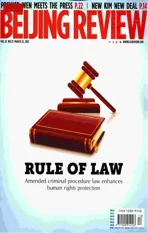Torn Down
2012-10-14ByNickCompton
By Nick Compton
Torn Down
By Nick Compton

LI SHIGONG
Biking toward the village, where I should have seen nothing but rare Beijing darkness, I saw a gleaming new Holiday Inn—complete with valet parking and big, gaudy columns.
It is a route I took every day in August 2008, to get to the Olympic wrestling venue,where I was serving as an Olympic News Service fl ash quote reporter.
As I had back in 2008, I recently pedaled my bike on the long, straight boulevard from the northeast gate of Tsinghua University heading toward the Wudaokou Subway Station. I turned off past a set of railroad tracks and headed straight on another flat stretch of highway.
I knew the area well back then from long afternoons and early evenings exploring the small store fronts and open-air fruit markets. I often stopped to talk to locals lounging in the sun and became a regular at a fantastic noodle restaurant owned by a family from Xinjiang Uygur Autonomous Region.
It was a welcome relief from the shiny lights and high-priced bars of the Wudaokou area near the subway station.
Adjacent to the pocket I knew so well was a small village, also full of life. Biking through it at sundown was one of my keenest memories from the Olympics. A whole community, from newborns to elders,would emerge in the cool evening air, exercising, playing mahjong, eating, sharing and laughing.
As I kept pedaling, my stomach sunk.The storefronts were gone. The restaurant was gone. The entire village was demolished to rubble, converted to an enormous construction zone hidden from sight by ugly aluminum obstruction walls.
My curiosity forced me to make a turn under the village’s old gate, and into the construction zone, marked off on each side by shoddy, battered walls.
Temporary structures were set up for the site workers. Brilliant PR-images of the area’s future high-rises were plastered along one wall.
A little farther down the road, some of the area’s residents were outside, huddled around a small, spotty canvas. Projected onto it was an out-of-date Chinese military movie. They were fascinated, and didn’t bother to look up as I eased by. A few teenagers were further down the road, quietly playing pool and smoking cigarettes. The vitality that I had felt three years ago was gone.
Then, convinced of my infallible geographic memory of the area, I made a near-disastrous decision. I remembered a small tunnel connecting the former village, now construction zone,to Tsinghua University, and I wanted to ride there. The only problem was that a gate was blocking the dirt path that, I fi gured, surely led out of the construction zone and to the tunnel.Luckily, the gate’s small bike entrance was open, so I breezed through.
Soon, the road became rugged. There were no people in sight, and no longer walls protecting me from the construction site rubble. It was very dark. Still, I thought the tunnel must be just around the corner. I pressed on.
Finally, I came to the end, an abrupt “T.”On the left was the driveway to a deserted warehouse building. On the right, another gate that looked much like the one I had just passed through. But, as I pedaled closer, I could see that there was no way through this one. Both the vehicle portion and bicycle portion were dead-bolted shut.
That’s when the dogs came.
I heard the barking immediately. Then the aggressive, unmistakable growl of an animal that wanted to rip my throat out.
From the bushes near the closed gate bounded a yellow mongrel of a dog, barking,shoulders hunched as I froze in panic.
I looked around. There were plenty of rocks to scoop up and miscellaneous rubble from the village that had been demolished. As I attempted to collect my thoughts, another dog appeared, barking.
Instinctively I yelled as loud as I could and kicked rocks up from under my bicycle.Then, I whipped my bike toward the path I’d come on and pedaled like hell, never looking back. The dogs continued to bark, but didn’t give chase.
Soon, my heart still thumping with adrenalin, I was back at the Holiday Inn, amazed at how quickly the area had changed, appraising the steep price of progress.
